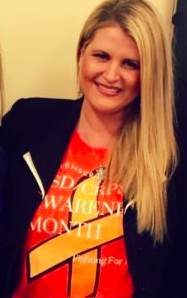All of us who struggle with chronic illnesses and pain have heard these phrases:
“But you don’t look sick!”
“You look (or sound) so much better!”
Or my favorite, “Well you might be sick but you sure don’t look or act like it!”
In theory, we should take these phrases for what they are – compliments. After all, who wants to look or sound sick? But instead, what we tend to hear through our filter of chronic illness and pain is, “You can’t really be in that much pain if you look normal,” or “Sick people don’t look, sound or act healthy,” or “How can you be normal today when you were in bed all day yesterday?” When it comes right down to it, we end up processing all of these comments simply as “You are faking it.” What should be a nice compliment ends up feeling like skepticism and judgment.
It’s no wonder “normal” and “healthy” people don’t understand invisible chronic illnesses and pain. After all, we as a society have been conditioned with messages from media — whether it’s television, movies, books or the internet — to believe that disabilities are only visible. When was the last time you saw someone in a movie who had a chronic illness or pain that wasn’t represented with a wheelchair, walking aid, oxygen tank, bandage, cast, blood, IV or something, anything that made their presumably invisible illness or pain visible?
People with chronic illnesses and pain in media are also portrayed as looking run down, not wearing makeup, messy hair, un-showered, in bed, moving slowly and just simply unwell. Don’t get me wrong — many of us look like or are in this condition 50 to 75 percent of the time. But the reality is, when we attempt (i.e., force ourselves at a great cost) to get out of the house, whether it be to socialize with friends, go to church, volunteer or for some of us, traditionally work — we try our best to blend in with the “normals.” This means putting forth our best face (aka, social mask) and distracting ourselves from the never ending chronic pain or symptoms we experience. You see, makeup isn’t a cure for chronic illness and pain, but it sure can make us feel better about ourselves.
So as opposed to “faking being sick,” we have to become masters at “faking being well.”
When people see us out for a couple of hours here and there – smiling, laughing, talking and the like, it does not mean we are magically well. On the contrary, we are striving to get a much needed respite from the constant physical and emotional stress we live in by focusing on something fun and positive.
Simply put, we are trying to survive and thrive by making the most out of our situations.
We are trying to live as opposed to just exist.
It doesn’t mean our chronic illnesses and pain disappear just because we have painstakingly gotten ready, put on a nice outfit, made ourselves pretty with makeup or decided to put on a nice (comfortable) pair of shoes. In fact, these seemingly minor tasks and activities healthy people take for granted come at a huge price for those of us with chronic illnesses and pain. And little do they know all of the accommodations we have built in when we do venture out. But I digress…
Healthy people who have never experienced chronic, life-changing medical issues will never understand just how difficult it is to try and fit in. We are trying to carve out some normalcy out of the crappy hand of cards we were dealt. It takes so much strategic preparation, rest and recuperation just to appear and act “normal,” but it helps us greatly to feel like a person again — if only for occasional short periods of time.
Having an invisible chronic illness and pain can feel like a blessing and a curse. On one hand, we don’t “look sick” on the outside for the most part. Most of us can temporarily blend in with society, which is great for those who don’t want to talk about their illnesses or have a “pity party.” On the other hand, we also want people to know what we are going through 24/7 and not judge us if we may have fun and “appear healthy” doing it. Just know we are actually far from healthy and just seeking compassion, understanding and support through our journeys.

So the message to healthy people is: of course we don’t want you to tell us we look sick –in fact, we appreciate your compliments. We want others to understand that just because our chronic illnesses and pain may be invisible to you, we’re always struggling with them– despite being “beat for the gods” (a.k.a, wearing a full face of makeup) to help cover up our suffering.
In the end, we just want to be recognized for the incredible strength we have and the sacrifices we make, all for the sake of blending in.

